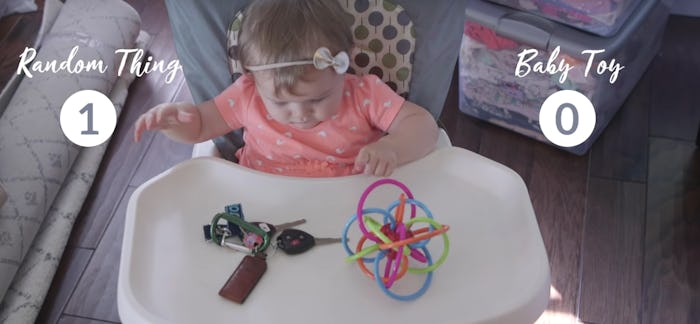The toy aisle at Target is more than a little tempting, for parents and children alike. But you know how it goes: no matter how many colorful and expensive toys you get for your kid, they'd rather bang on your pots and pans. And, thankfully, this video shows why kids don't really need a bunch of toys. After all, they'll probably ignore them in favor of your car keys anyway.
Believe it or not, your kid isn't the only one who would rather play with forks and spoons than the fancy schmancy toy you lovingly bought for him. Showing how common an experience it is, New York based mommy vlogger, and the face behind the popular YouTube channel "Story of This Life," Esther Anderson created the video "Baby Toys Vs Random Things," to test "this theory about babies and baby toys." In the video, Anderson's little one repeatedly chooses the "random thing" over the toy — every single time, in fact.
While Anderson's video is likely just a fun example of a common parenting struggle, it does make it clear that babies don't really need all the bells and whistles. And as HuffPost pointed out, Anderson's video is a timely reminder for the holiday season not to go overboard on toys. In fact, experts suggest keeping toys to a minimum in order to foster creativity and increase happiness, as Very Well reported.
In the video, Anderson's daughter can be seen playing with sunglasses, a pack of baby wipes, and even an empty water bottle instead of the toys in front of her. And her choices line up with what experts say about play. Deborah MacNamara, a clinical counsellor in Vancouver and author of the parenting manual Rest, Play, Grow, told Today's Parent that without buying a ton of toys, your home probably has more than enough to keep your little one engaged:
Children need to play, but this doesn’t require toys. They will explore their environment and examine articles that are interesting to them — from pots and pans to blocks.
Instead of showering them with toys, MacNamara suggested, according to Today's Parent, that parents allow their children to gravitate towards the things in their environment that interest them.
MacNamara isn't the only expert who advocates a less-is-more approach to toys. In a past interview with Romper, Houston-based social worker and psychotherapist Vicki Sherman, who has extensive experience in play therapy, said that babies should have three to five interesting things to play with. "Your baby doesn't have to have 10 toys. Three to five interesting things to look at and feel is definitely enough," she said. And "interesting things" aren't limited to packaged toys, according to Sherman. Tupperware, balls, pots, and pans all work for play.
And if all else fails, just toss your kid an avocado. It worked for this little boy who received one from his family as a gift and loved it.
Indeed, giving your baby or toddler too many toy options may be to their detriment. For instance, researchers from the University of Toledo in Ohio conducted a study involving 36 toddlers. The little participants were invited to play for 30 minutes in a room with either four or 16 toys. Those who had fewer toys to play with were more creative and played with each toy for twice as long, according to The Telegraph. For this reason, the study's lead author Dr. Carly Dauch told the journal Infant Behavior and Development that number of toys are linked to quality of play:
The higher number of incidences of play in the 16 toy condition did seem to interfere with duration and depth of play. Other toys present may have created a source of external distraction. During toddlerhood, children develop, but may not have mastered, higher level control over attention. Their attention, and therefore, their play may be disrupted by factors in their environments that present distraction. The results of the present study suggest that an abundance of toys may create such a distraction.
Given the potential drawbacks of numerous toys in the toy box, and babies' tendency to prefer "random objects" anyway, parents can feel good about skipping the splurge this holiday season. Instead, encourage them to play with what they already have.
